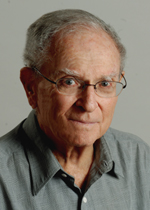

|

|
IN MEMORIAM
Arthur R. Bergen
Professor of Electrical Engineering and Computer Sciences, Emeritus
UC Berkeley
1923-2014
Arthur R. Bergen, Professor Emeritus in the Department of Electrical Engineering and Computer Sciences (EECS) at the University of California, Berkeley, died on Saturday, July 19, 2014 at Kaiser Hospital, Oakland, following a short illness from kidney disease.
Born in Brooklyn on April 7, 1923, Art was among the youngest of the generation that served in World War II. After completing his undergraduate education, he was trained as a Signal Corps officer and served in the Army of Occupation in Germany after the war ended. He was honorably discharged from the Army as a First Lieutenant.
Arthur obtained his Ph.D. degree in Electrical Engineering from Columbia University and joined the Berkeley faculty as Assistant Professor of Electrical Engineering in 1958.
Arthur’s early research was in control theory, focusing on techniques of nonlinear control. Starting in the 1970’s with a worldwide focus on energy, Arthur shifted his research to electrical power and made lasting contributions in power system analysis. He introduced innovative models and tools that helped usher in a new thrust in the technical community in the development of theory and application of direct methods (vs. computer simulations) to assess stability of an electric power grid after a major disturbance. Many algorithms have since been developed for direct methods that are now routinely used for on-line stability assessment of large interconnected power girds all over the world.
Art’s shift into power systems was timely not only in terms of his research contributions, but perhaps even more important in terms of his impact on education. His introductory textbook Power Systems Analysis (Prentice-Hall, 1986, 2000) provided the first comprehensive coverage of modern computer-based methods and tools in designing and improving electric power systems. It brought a modern approach to the subject with great simplicity and elegance. It breathed new life into a field that had been nearly dormant and helped to launch the careers of a new generation of researchers and practicing professionals. Art worked closely with his graduate students, several of whom are now eminent academics in leading U.S. universities.
Throughout his professional career, Arthur sought to combine his expertise in technology with his deep socio-humanistic instincts. His interest in serving people took him to Brazil early in his career, where he installed electrical equipment on a jungle river; and to the newly established Indian Institute of Technology at Kanpur (1963-65), where he played an important role in establishing a system of self-governance. In Berkeley his skills in interacting with people of all walks and ages made him a beloved teacher and a particularly effective Associate Dean of Engineering for ten years. Arthur was elected a Fellow of IEEE and honored with the Berkeley Citation in 1991.
Arthur loved life, people and places with an enthusiasm that did not dim with age. His love of travel took him and his wife Jane to nearly every continent including Antarctica, and they trekked in mountains from the Sierras to the Himalayas. Possessing a level of practical skills that belied his big-city origin, he built a lovely redwood cabin on the Sonoma coast by hand and almost entirely out of recycled materials. Blessed with excellent health and mental alertness until the last and a personality of natural warmth and kindness, he will be long remembered and missed by all those whose paths he crossed.
Arthur is survived by his wife of 62 years, (Wilma)-Jane Stockman Bergen; sons John, Roger and James; and their families.
Eugene Wong
William Oldham
Felix Wu